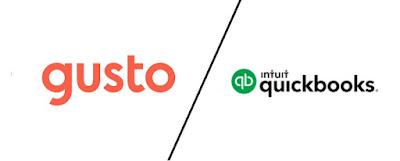
gusto vs QuickBooks
As a business owner, you know how crucial it is to have the right tools and software in place. And when it comes to managing your finances and payroll, two names often come up: Gusto and QuickBooks. These two accounting powerhouses have been battling it out for years, each offering their own unique set of features and benefits.
But which one is truly better for your business? In this epic showdown, we'll dive deep into the world of Gusto vs QuickBooks to help you make an informed decision. So buckle up, because we're about to embark on a journey that will revolutionize the way you handle your financial management!
Comparison of QuickBooks vs Gusto
When it comes to comparing QuickBooks vs Gusto, there are several key factors to consider. Let's take a look at QuickBooks. With its robust accounting features and user-friendly interface, QuickBooks has long been a favorite among small businesses. It offers comprehensive financial tracking and reporting capabilities, allowing you to easily manage your income, expenses, and invoices.
On the other hand, Gusto specializes in payroll management. It streamlines the entire payroll process by automating tasks such as calculating employee wages and taxes. Gusto also takes care of tax filings on your behalf, saving you time and ensuring compliance with regulations.
Another aspect to consider is pricing. While both platforms offer different pricing plans based on the size of your business and specific needs, Gusto tends to be more cost-effective for smaller businesses with fewer employees.
Usability is another factor that sets these two apart. QuickBooks may have a steeper learning curve initially but provides greater depth in terms of functionality once you become familiar with the system's intricacies. On the other hand...
Though each platform brings its own unique strengths to the table when it comes to managing your business finances effectively, the ultimate decision on which one to use will depend on the specific needs and size of your business.
QuickBooks Overview
QuickBooks is a well-known accounting software designed for small and medium-sized businesses. It offers a range of features that make managing finances, invoicing, payroll, and tax preparation easier than ever.
With QuickBooks, you can track income and expenses, create customized invoices, manage bills and payments, generate financial reports, and even handle inventory. Its user-friendly interface makes it accessible to those without extensive accounting knowledge.
One of the key advantages of QuickBooks is its integration capabilities with other business tools such as CRM software or e-commerce platforms. This allows for streamlined data transfer and improved efficiency.
Additionally, QuickBooks provides robust security measures to protect sensitive financial information. Data encryption ensures that your data remains safe from unauthorized access.
QuickBooks offers a comprehensive solution for business financial management. Whether you're a freelancer or running a larger organization, this software has the flexibility to adapt to your needs while simplifying complex accounting tasks.
Gusto Overview
Gusto is a comprehensive payroll and HR software designed specifically for small businesses. With its user-friendly interface and intuitive features, Gusto streamlines the complex processes of managing payroll, benefits, taxes, and employee on boarding.
One of the standout features of Gusto is its simplicity. The platform guides you through setting up your company's payroll in just a few steps, making it easy to get started even if you have little to no experience with payroll management.
Gusto also offers automated tax filing and compliance assistance, which can save you time and help ensure accuracy when it comes to paying taxes and adhering to government regulations. This feature eliminates the need for manual calculations or hiring an accountant solely for tax purposes.
Another advantage of using Gusto is its integration capabilities. It seamlessly integrates with popular accounting software like QuickBooks Online, allowing you to sync your financial data effortlessly.
Additionally, Gusto goes beyond just payroll processing by offering robust HR functionality. You can use the platform to manage employee benefits such as health insurance plans or retirement savings accounts.
Gusto provides a powerful yet user-friendly solution for small businesses looking to streamline their payroll and HR processes while ensuring compliance with tax regulations. Its simplicity, automation features, integration capabilities make it an attractive choice for businesses seeking efficiency in their operations.
Pros and Cons of Gusto vs QuickBooks
When it comes to choosing the right software for your business, there are pros and cons to consider for both Gusto vs QuickBooks. Let's take a closer look at each.
Gusto:
One of the main advantages of using Gusto is its user-friendly interface. The platform is designed with simplicity in mind, making it easy for even non-accountants to navigate and understand.
Another pro of using Gusto is its comprehensive payroll features. It automates many aspects of payroll processing, such as tax calculations, deductions, and direct deposit payments. This can save you significant time and reduce the chances of costly errors.
Additionally, Gusto offers excellent employee self-service tools. Employees can access their pay stubs, W-2 forms, and other important documents online at any time. This streamlines communication between employers and employees while promoting transparency.
However, one limitation of Gusto is that it focuses primarily on payroll management rather than offering a full suite of accounting solutions like QuickBooks does. If you need more extensive financial tracking capabilities or require features beyond payroll management alone, this may not be the best fit for your business.
QuickBooks:
QuickBooks is known as one of the most popular accounting software options available today. One major advantage is its versatility – it caters to businesses across various industries with different needs.
With QuickBooks' robust feature set, you have access to powerful tools for invoicing clients, managing expenses, tracking inventory levels, and generating detailed financial reports. This level of functionality makes it suitable for small businesses seeking comprehensive accounting solutions all in one place.
Moreover, this software integrates seamlessly with numerous third-party apps, such as payment processors, e-commerce platforms, and CRM systems.
This allows you to tailor your setup according to your specific requirements and enhance efficiency within your workflow.
On the downside, the learning curve for QuickBooks can be somewhat steep if you're newt accounting software or not tech-savvy. It can take time to become proficient with its many features and functions. Additionally, it may be more expensive than other options such as Gusto, depending on the plan you choose.
Which Is Better For Your Business?
When it comes to choosing between Gusto and QuickBooks for your business, the decision ultimately depends on your specific needs and preferences. Both platforms offer a range of features and benefits that can help streamline your business operations, but they cater to different aspects of running a company.
QuickBooks is primarily known for its robust accounting capabilities. It allows you to easily manage invoices, track expenses, generate financial reports, and handle payroll tasks. With its user-friendly interface and comprehensive set of tools, QuickBooks is an excellent choice for small businesses looking to efficiently handle their financial management.
On the other hand, Gusto specializes in providing HR solutions such as payroll processing, tax filing services, employee benefits administration, time tracking, and more. If managing your employees' needs is one of your top priorities or if you have a growing team that requires efficient HR management tools, Both Gusto and QuickBooks have their pros and cons when it comes to pricing structures as well. While Gusto offers transparent pricing with affordable monthly plans based on the number of employees in your company, QuickBooks has multiple subscription options depending on the level of functionality you require.
Deciding which platform is better for your business will depend on what aspects are most important to you - whether it's robust accounting features or comprehensive HR solutions.
By carefully evaluating your specific needs and comparing them with what each platform offers, you'll be able to make an informed decision that best suits your business requirements.
Conclusion
After comparing the features, functionalities, and benefits of Gusto vs QuickBooks, it is clear that both platforms have their strengths and weaknesses. The ultimate choice between the two depends on the specific needs and requirements of your business.
If you are primarily focused on streamlining your payroll processes, managing employee benefits effortlessly, and ensuring compliance with tax regulations, Gusto might be the better option for you. With its user-friendly interface, automated payroll calculations, and comprehensive HR tools, Gusto can simplify your HR operations significantly.
On the other hand, if you need a robust accounting solution that offers advanced financial management capabilities such as invoicing clients or tracking expenses in addition to basic payroll functionality, QuickBooks might be more suitable for your business. Its extensive reporting options and integration with other accounting software make it an excellent choice for small businesses looking to manage their finances effectively.
Before making a decision between Gusto and QuickBooks, take some time to evaluate your specific business needs. Consider factors such as budget constraints, company size growth potential future requirements (such as scalability), industry-specific features required (if any), ease of use support options available from both providers among others.
Remember that while this comparison provides valuable insights into these two popular solutions' key differences - there is no one-size-fits-all answer when it comes down to choosing which platform will work best suited best by Your Business Needs! Take advantage now-based information we've provided here today – so go ahead make informed decisions about selecting either system based upon criteria most relevant OUR unique situation!
In conclusion- It's important always consider what matters most YOUR BUSINESS MAKING DECISIONS LIKE THESE THAT WILL IMPACT HOW SMOOTHLY THINGS RUN AT WORK every day moving forward without losing sight overall goals objectives set forth since inception beginning stages planning growth journey together onwards towards SUCCESS long haul...
So choose wisely!

